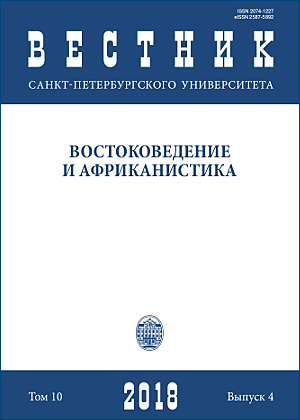Language strategy of explaining the Buddhist notion “The Other Shore” in Yu Jian’s poem-play
DOI:
https://doi.org/10.21638/spbu13.2018.404Аннотация
В некоторых буддийских школах (Чань, Линь-цзи) сложилось скептическое отношении к вербальной передаче знания об опыте просветления. Однако язык в них не находился на маргинальной позиции: его потенциал, а также границы возможностей были исследованы и использованы. В рамках данной статьи на примере группы лишенных повседневной логики текстов (гун-ань) в форме вопросов/ответов учителя и учеников исследуется языковая стратегия этой особенной коммуникации, ее функционирование в традиции и современной литературе. Цель исследования заключается в том, чтобы показать связь между способом говорения о другом береге — состоянии недуальности — в текстах гун-ань и в стихотворении-пьесе поэта Юй Цзяня «Дискуссия о выражении “другой берег”» (1998 г.). Несмотря на то что Юй Цзянь — яркая фигура авангардного поэтического мира Китая, никто из китайских, европейских или американских исследователей не касался еще темы анализа его стихотворения-пьесы «Дискуссия о выражении “другой берег”», которая кажется важной в плане осмысления динамического проникновения традиции текстов гун-ань в структуру поэтико-драматического произведения Юя, где он касается вопроса описания трансцендентного. Разбор и сравнение этих текстов и текста Юй Цзяня помогает увидеть, что последний стилистически выстроен по модели развернутых решений гун-ань о том, что есть другой берег. В результате проблема поиска Юй Цзянем способа вербализации понятия «другой берег» в своем произведении приобретает новое осмысление в русле буддийской философии, что приводит нас к выводу о жизнеспособности данной традиции в современном художественном тексте.
Ключевые слова:
буддизм, языковая стратегия, гун-ань, другой берег, стихотворение-пьеса, Юй Цзянь
Скачивания
Библиографические ссылки
Загрузки
Опубликован
Как цитировать
Выпуск
Раздел
Лицензия
Статьи журнала «Вестник Санкт-Петербургского университета. Востоковедение и африканистика» находятся в открытом доступе и распространяются в соответствии с условиями Лицензионного Договора с Санкт-Петербургским государственным университетом, который бесплатно предоставляет авторам неограниченное распространение и самостоятельное архивирование.





